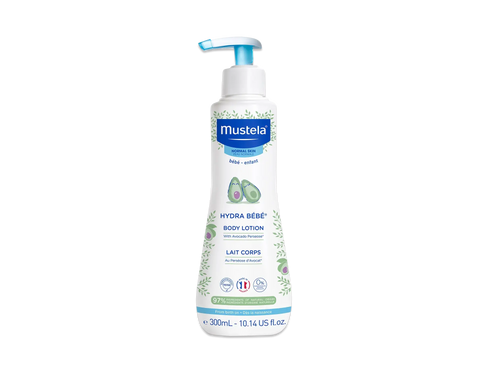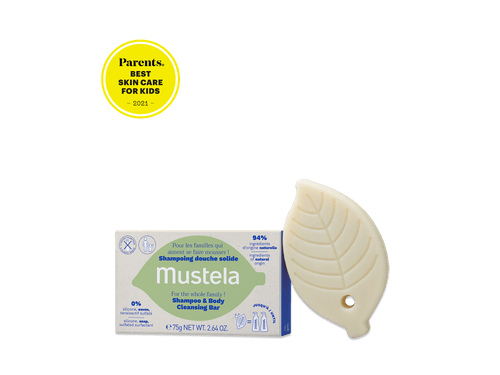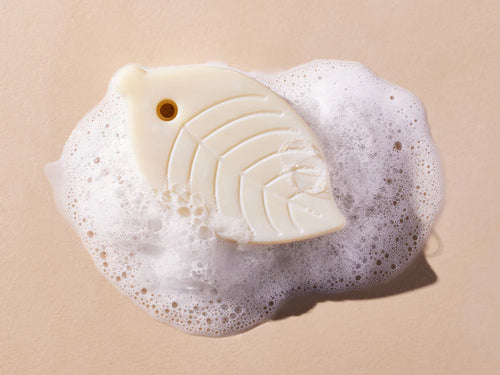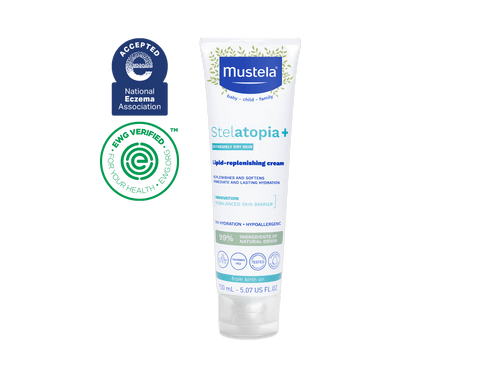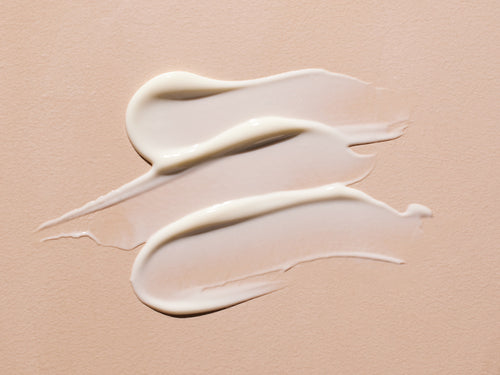The last five months have probably flown by. It might seem like just a week or two ago that your little bundle of joy arrived. All of a sudden, your 5 month old baby is alert, smiling, showing affection, and even making a few first efforts to communicate. How the times have changed!
In this post, the baby experts at Mustela will answer all the questions you may have about caring for your 5 month old baby.
We’ll start by giving you all the info you need about your little one’s development, senses, motor skills, feeding schedule, sleeping habits, and immunizations. Then we’ll cover a few general childcare tips for five month olds.
Finally, we’ll close with some warning signs that your little one has a developmental delay. We have a lot to cover, so let’s get to it.

Caring For Your 5 Month Old Baby
After more than 20 weeks of parenting, you’ve become a pro at changing dirty diapers and you’ve got your daily hygiene routine down pat. But children change quickly, so it’s normal to have a few questions about your baby’s growth. Let’s address all those now.
Your 5 Month Old Baby’s Development
Around the five-month mark, your little one will have roughly doubled in weight since birth. That makes carrying your baby a bit more of a chore than it used to be!
Five-month-old girls typically weigh between 13.9 pounds (6.3 kg) and 16.3 pounds (7.4 kg) and are normally 24.6 inches (62.5 cm) to 25.8 inches (65.5 cm) in height. Baby boys tend to be larger. On average, five-month-old boys are normally 15.2 pounds (6.9 kg) to 17.9 pounds (8.1 kg) in weight and are between 25.4 inches (64.5 cm) and 26.6 inches (67.5 cm) tall.
Of course, these numbers are just average. There’s no need to worry if your 5 month old baby is bigger or smaller than the figures above. Every child develops at their own pace.
Activities To Encourage Development
You’re already starting to see how curious your baby really is at five months old! They're discovering all the things around them.
This is the ideal time to help encourage your baby to thrive in their environment by interacting with them regularly. The best time of the day to try to engage your baby is in the morning, which is usually when they’re the most active and content.
Here are some ideas:
- Play peek-a-boo
- Play hide-and-seek with toys to help your baby understand object permanence (the understanding that objects still exist even when they can’t be seen)
- Give them toys to pick up
- Use household items as toys (ex: plastic container lids or wooden spoons)
- Get down on the floor and interact directly with your baby
- Play some music
- Sing songs to your baby
- Give your baby some supervised alone time (let them explore on their own)
- Talk to your baby
- Take them for a walk outside
Your 5 Month Old Baby’s Senses
Your little one’s senses develop rapidly over the first several months of their life. When your child was first born, they could hardly see and probably seemed unaware of their surroundings. Now, your 5 month old baby is alert, active, and curious.
Your little one’s vision is almost fully developed, and they can see most objects clearly. They can recognize familiar faces.
They may also be able to recognize familiar objects, like a favorite stuffed animal or toy. Make sure to keep plenty of bright, colorful objects in your baby’s nursery to stimulate their vision.
Your baby’s hearing has also become sharper. They’ve been able to recognize your voice for a long time, but now you may notice them responding more enthusiastically when they hear the sound. They will begin to identify other sounds too, like that of a rattle or shaker.
Since your baby has yet to try a wide variety of foods, their sense of taste is still developing. And while your baby can smell different scents, they are still learning to associate smells with specific objects.
Last, but not least, is your baby’s sense of touch. Of course, they still love being held by Mom or Dad and they love the feeling of skin-to-skin contact. Now, your little one will be curious about how everyday objects feel.
They’ll probably want to touch and rub practically every object they see. Allow them to explore, but keep a close eye on them to make sure they aren’t touching anything dangerous.

Your 5 Month Old Baby’s Motor Skills
By the time your baby is five months old, their muscles have developed a great deal since they were born. This enables them to have a whole range of new motor skills.
Your little one should meet a few milestones throughout their fifth month of life, but keep in mind that all babies are unique. Your five month old may not be able to meet all of these milestones right away, especially if they were born prematurely. And that’s OK!
But, in general, Your 5 month old baby should soon be able to check these off the milestone chart:
- Support the weight of their own head
- Stay in a seated position when their back is supported
- Make fists, grab objects, and move objects with some intention
- Lift their head and shoulders off the ground when on their belly
- Roll from their back onto their tummy or vice versa
- Kick their legs firmly
- Mimic facial expressions
- Follow an object with their eyes
- Babble (trying to make sounds with their mouth)
- Have different, distinct cries
Again, remember that each child develops at their own pace. If your 5 month old baby hasn’t hit one or more of these milestones yet, don’t be alarmed. Your little one will get there soon!
Just give your baby plenty of tummy time and they’ll reach these milestones in no time. Before you know it, they’ll be crawling around the house and taking their first few steps.
(Take a look at our “When To Be Concerned” section regarding any unmet milestones.)
Your 5 Month Old Baby’s Feeding Schedule

At five months of age, babies don’t need to eat as often as in months prior, but they will still need to be fed every three to four hours. If you’re formula-feeding your little one, they should consume about four ounces of formula six times per day.
If you’re breastfeeding, simply feed your baby when they’re hungry and continue to feed them until they seem content.
Many parents wonder if their 5 month old baby is ready for solid foods. It’s important to note that medical professionals recommend breastfeeding exclusively for the first six months of your child’s life.
However, it’s generally safe to give your baby soft solid foods, like mashed bananas or peas, once they’re twice their birth weight and can hold their head up without struggling.
Consult your pediatrician if you plan on introducing solid foods to your little one’s diet before the six-month mark.
You may also be curious about water. Like solid foods, it’s best to wait until your little one is six months old to start giving them any water to drink. Breastmilk or baby formula is all a 5 month old baby needs to stay healthy.
Preparing For First Foods
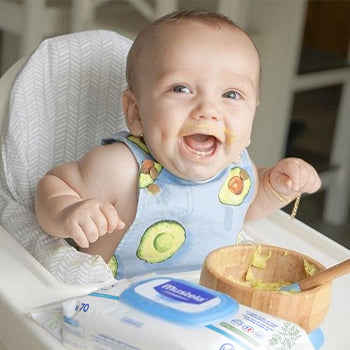
Even though your baby isn’t quite ready for solids, you can start making preparations since their first foods are right around the corner!
Take a look at some ways you can prepare for your baby’s first bite:
- Make a plan and decide what food you want your baby to try first (ex.: cereal, oats, or veggies). Also, discuss your plan with your baby’s pediatrician. Most want babies to try bland cereals or oatmeal before anything else. And remember to wait at least three days between new foods.
- If you’re preparing your own baby food, start making and freezing it now. If making your baby’s puree food is new to you, this is a good time to start researching how to do so.
- If you’re buying baby food, read food labels and do some research on what brand of baby food you want your little one to eat.
- Stock up on bowls, spoons, and bibs before your baby’s first day of trying solid foods!
Don’t forget about our Cleansing Wipes when the time comes for your baby to eat real food. These wipes will come in handy when you need a quick clean-up after a messy meal!
How To Know If Your Baby Is Ready For Solids
Your baby will give you some clues to let you know they’re ready for something more than just formula or breastmilk. These clues include:
- Opening their mouth when food is near it
- Having doubled their birth weight
- Showing interest in food (ex: reaching for a spoon and watching you eat)
Your 5 Month Old Baby’s Sleeping Habits
At five months old, your baby sleeps roughly 14 to 15 hours per day. As many as 10 of these hours will come at night, allowing you to catch up on some of the rest you’ve missed over the last several months. If you’re lucky, your baby will even sleep up to eight hours in a row at night.
Your little one also still needs to take a few naps throughout the day. Some babies take two long naps of two to three hours per day. Other babies might prefer three shorter naps of around 90 minutes.
Both cases are perfectly normal. Just remember to always put your baby down to sleep on their back.
Nighttime Routine
If you haven’t established a good and predictable bedtime routine, now is a great time to start! Before you put your baby down for the night, make sure you give them the tools to fall asleep on their own.
For instance, don’t let your baby fall asleep at the bottle or breast. And if this habit is already set in place, go ahead and break it right away.
The key is to put your baby down in their crib while they’re still awake but somewhat drowsy.
Remember to pay attention to sleep cues. Some sleep cues might include yawning, rubbing their eyes, putting their hands behind their head, or getting really fussy. Most of the time if your little one is fussy, they’re past the point of exhaustion.
To create your little one’s nighttime routine, establish expected patterns for each night. This could include reading a story, singing a song, and giving your baby a massage or bath right before bedtime.
And for a relaxing bathtime routine, try adding our Multi-Sensory Bubble Bath! Engage your baby’s senses while they splash and touch the bubbles.
When it’s time to give your baby a gentle but thorough wash, try using our Stelatopia Cleansing Gel, especially if they eczema-prone skin.
Lastly, give your baby a soothing massage with our Baby Oil. It will moisturize their skin and help stimulate their senses to relax and prepare for bed. Your little one will be ready to snooze in no time!
Safe Sleep
Safe sleep practices are important for babies of every age. At five-months-old, your baby has probably started rolling over. If not, pay close attention because it’s coming soon!
This means your little one has most likely started rolling from back to tummy while they’re sleeping. So at five months old, it’s time to stop using the swaddle at night because it’s no longer safe.
This is because if your baby is still swaddled while they roll over, they won’t be able to roll back over, causing a very dangerous situation.
And remember back is still best. Even if your baby is rolling over in the middle of the night, continue to place them on their back when you lay them down for the night or for a nap.
(Note: Some babies start to regress in their sleep patterns once they learn a new skill, including rolling over. For more on this, take a look at our article, The Complete Guide To Understanding And Surviving Sleep Regression.)

Your 5 Month Old Baby’s Immunizations
Good news: your baby won’t need any new immunizations at five months old. However, they should have already received a number of vaccination shots. Those immunizations are:
- Two rounds of Hepatitis B vaccine
- One round of Polio vaccine (IPV)
- Two rounds of Rotavirus vaccine (RV)
- Two rounds of Diphtheria, Tetanus, and Pertussis vaccine (DTaP)
- Two rounds of Haemophilus influenzae type B vaccine (HIB)
- Two rounds of pneumococcal conjugate vaccine (PCV)
If your little one isn’t up to date on immunizations, now is the perfect opportunity to get caught up! Vaccination shots are super important for your child’s health, so you’ll want to keep them current.
Preparations During The Fifth Month

Before your baby turns six months old, it might be a good idea to make some preparations for the coming months. Because before you know it, your baby will start crawling around and getting into everything they can put their hands on!
Start babyproofing your home if you haven’t done so already. This includes putting locks on lower cabinets, especially the ones where the chemicals are hiding, and putting outlet covers on each outlet.
Once your baby starts crawling, they’ll try to put their finger in the socket or even try to put a toy or something else in it, so it’s important to keep the sockets covered at all times.
Since your baby is rolling over now, keep their diaper changing area safe. And when changing your baby on an elevated surface — like a diaper changing table, bed, or couch — keep one hand and both eyes on them at all times.
It’s even better if you have a changing table with straps to keep your little safe and snug for the time being. After all, rolling over is new to them and they’ll probably want to practice their new skill any chance they get!
And lastly, keep our food preparations from above in mind as your baby gears up to take their first bite of solid foods in the next month!
General Child-Care Tips

Nothing is as important as your child’s safety. Below are a few safety tips to follow:
- Always put your baby to sleep on their back and never on their stomach or side.
- Never leave your baby unattended, even if it’s just for a few seconds.
- Babyproof your home to make sure your baby is safe at all times.
In addition, always use safe skin care products on your little bundle of joy. Your baby has soft, delicate skin that is easily irritated, especially by-products with harsh ingredients and chemicals.
Instead, use gentle, baby-friendly products like Mustela’s. We offer a range of baby-safe products made with gentle ingredients, like body wash, shampoo, creams and lotions, and even baby-safe mineral sunscreen. Taking extra special care of your little one’s skin is vital.
When To Be Concerned
There are a few signs of a developmental delay that you should be aware of. Head to the doctor’s office as soon as possible if your 5 month old baby:
- Can’t hold up the weight of their own head
- Doesn’t seem to recognize you and your partner by sight or by your voices
- Doesn’t respond to loud noises
- Has not yet smiled or laughed
- Is unable to grasp and hold small objects in their hands
- Is not cooing or making baby babble sounds
If your baby isn’t showing any of these early warning signs, then everything is peachy keen.
Your Five Month Old At A Glance

Your baby is growing like a weed during their fifth month, and a lot of changes are taking place right before your eyes! They’re learning, growing, and adapting to their environment.
Lots of milestones are getting checked off the list, and their motor skills are developing day by day. Sleep patterns and eating patterns are changing as your five month old is getting ready to take their first bite of real food.
Since your baby won’t have a scheduled doctor visit this month, use this time to catch up on any previously missed vaccinations. Also use this time to make preparations for the coming months when new skills, like crawling, will soon be checked off the box.
Finally, when it comes to your baby’s skin, Mustela has just what they need not only for this month but for the years to come. So take a look at some of our best sellers to give your baby the best skincare!
Keep giving your baby plenty of hugs and kisses and taking plenty of photos, because your 5 month old baby will be starting school before you know it!





